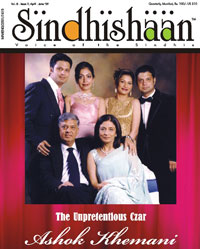THE NEED FOR VOCAL CULTURE
ByRam Jawhrani

Independence, for India came as a mixed blessing. It was freedom, no doubt from the shackles of slavery and colonial rule. But the people of Sindh suffered. While a portion of Punjab was merged with India, the whole of Sindh was included in Pakistan. Several thousand Hindus in Sindh left their homeland penniless and migrated to India as refugees, they were put up in refugee camps and initially had to survive on doles. Despite suffering the pangs of partition Sindhis retained the spirit of enterprise within them. Soon they made rags to riches stories and today approximately one crore Sindhis, scattered all over the globe have achieved economic prosperity, exclusively due to their spirit of entrepreneurship and business acumen.
Sindh was the land of Sufi poets – Shah, Sachal and Sami. Sufism therefore had a great impact and influence on the Sindhi culture. Sufism taught Sindhis to follow the principle of brotherhood and broadmindedness. It is precisely for this reason that Sindhis integrated deeply with other communities wherever they settled in India after migration. Even today a Sindhi settled in Akola or for that matter in Amravati speaks in chaste Marathi and has been totally influence by the Maharashtrian culture. The same is the case with other Sindhis who have settled in various states of India.
Although on economic front Sindhis have done remarkably well, they feel culturally starved. The rich Sindhi culture has remained a thing of the past. The younger generation, in particular, is unaware of their ancient Sindhi culture whose origin is traced to Indus valley civilization. India is only an improved from of “Ind” or “Sindh” – these words are from the name of the biggest river, Sindhu or Indus which runs through the heart of Sindh. The claim of Sindh to this glorious past was proved conclusively by the Mohan-Jo-Daro excavations which revealed a beautiful model city buried beneath the earth about 5000 years ago. Besides Sindh has in succession, given birth to a galaxy of poets, most of whom were known and are till date worshipped as saints, sages, prophets, and as incarnations of God.
The rich Sindhi literature, which gives a glimpse of the ancient culture has remained only in books for the younger generation who are not able to read and write their own mother tongue. The craze for English medium education and the influence of languages of the other states where Sindhis have settled are attributed as the main reason for the decline in Sindhi readership. Today there are very few Sindhi medium schools in the country as many of them have been shut down due to dearth of students. Sindhi newspapers and books have limited readership because they are scanned only by the elder generation of the community. This has created an awakening among the Sindhis to preserve their culture and make the younger generation aware of their ancient past and ancestors.
I personally feel that the best way to preserve the Sindhi culture is to develop the vocal culture in the form of folk songs, drams, and dance ballets. We will have to acquaint the younger generation with the Sindhi culture through the medium of stage shows. Once the youngsters realize how rich their mother tongue is, they will automatically be attracted to read and write their mother tongue. Therefore the responsibility rests on the cultural organizations of the Sindhi community to hold cultural “melas” in all parts of the country which have Sindhi settlements.
For instance, Sahyog Foundation, a socio-cultural organization has been organizing cultural programs and shows in Mumbai and other places from time to time. The foundation has also introduced a publication in English and Sindhi, “Sahyog Times International” which mainly aims to promote Sindhi culture. “Sindhi Shan” is another publication in English which mainly aims at promoting Sindhi Culture.
There are several Sindhi writers of eminence whose literary works have received wide acclaims and awards; I personally feel that if some of their literary work or pieces are translated into English it will help the younger generation in understanding the rich Sindhi culture. I am sure they will be attracted towards the sweetness of Sindhi language and will be tempted to read and write in their mother tongue.
Another way of preserving the Sindhi culture can be through the religious sects. The Sadhu Vaswani mission headed by Dada Jashan Vaswani and the religious path led by Saint Asharam of Ahmedabad can create awareness among the younger generation about their culture through regular religious discourses.
Besides this, a Sindhi University should be established by the government. That will act like an “oasis” in the deserted lives of Sindhis. A university which is surrounded by scholars will help in contributing to their knowledge and will help strive for the promotion and development of the Sindhi literature and culture.
Every State in India has regional language which is promoted by the government. Since Sindhis are stateless citizens, their language has not been promoted. It is therefore the responsibility of the government to promote the Sindhi language in schools and universities.
The non governmental organization has also a role to play in the promotion of the Sindhi language and culture. More and more cultural programs and stage shows should be organized across the country. Only through vocal culture, can the younger generations be made aware about their Sindhi culture.


